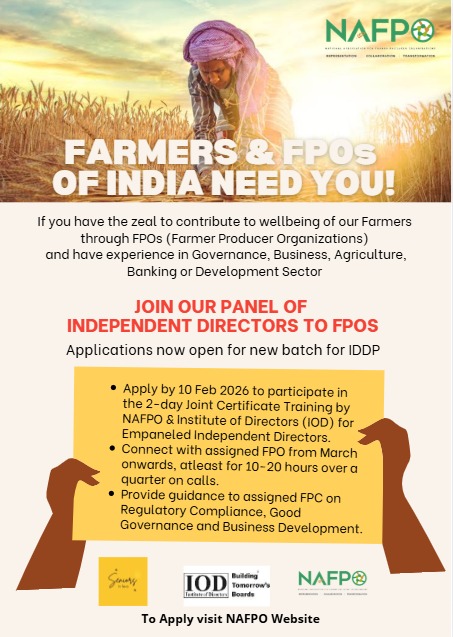About the Programme
The Independent Director Development Programme (IDDP) is an initiative by the National Association for Farmer Producer Organisations (NAFPO) to strengthen governance standards in Farmer Producer Organisations (FPOs). The programme aims to:
- Ensure statutory and fiduciary compliance,
- Improve credibility and management systems of FPOs,
- Provide professional guidance through empaneled Independent Directors (IDs).
Independent Directors are experienced professionals willing to support FPOs by taking on fiduciary and governance responsibilities. NAFPO and its partners will train these individuals and facilitate their onboarding with selected FPOs. NAFPO will assist in processing the Director Identification Number (DIN), Digital Signature Certificate (DSC), and coordinate the initial introduction between IDs and FPOs.
About NAFPO
NAFPO is a national-level body working to strengthen the FPO ecosystem. It collaborates with various stakeholders to enable FPOs to function as effective farmer collectives. NAFPO promotes sustainable livelihoods, inclusive rural growth, and institutional governance. It seeks to position qualified Independent Directors within FPOs to strengthen compliance and facilitate better access to finance, technology, and markets.
Concept of FPO
Farmer Producer Organisations (FPOs), especially Farmer Producer Companies (FPCs), are institutional collectives registered under the Companies Act, 2013. They aim to improve the livelihoods of small and marginal farmers by enhancing access to technology, finance, inputs, and markets.
FPCs engage in activities such as procurement, grading, marketing, and selling of agricultural produce and can also undertake value addition and provide services to members.
Partnership for Independent Director Development
NAFPO has partnered with Seniors in Seva (SIS), an organization that engages professionals aged 60–70 with rich experience and willingness to contribute to social development. SIS identifies volunteering opportunities for such experts in the non-profit and FPO sectors, aligning them with the needs of FPOs.
Training of Independent Directors
NAFPO, in partnership with the Institute of Directors, will organize certificate training sessions for IDs. Participants will be selected based on availability, willingness, and relevant experience. Post-training, IDs will be matched with suitable FPOs and engaged in periodic review and experience-sharing sessions to monitor progress and impact.
Role of the FPO
FPOs are expected to:
- Share necessary background information with the assigned ID,
- Maintain regular communication,
- Treat the ID as a mentor, not as a decision-maker,
- Use the ID’s expertise for governance, compliance, and strategic support.
Only the FPO Board retains final decision-making authority. It is essential for FPOs to build a trust-based relationship with their assigned ID.
FPO Eligibility Criteria
FPOs registered under the Producer Companies Act, 2013 are eligible to apply. Criteria include:
|
S. No |
Indicator |
Description |
|---|---|---|
|
1 |
Registration |
Companies Act, 2013 – Producer Company |
|
2 |
Paid-up Share Capital |
At least ₹1,00,000 |
|
3 |
Number of Members |
100+ |
|
4 |
Number of Buyers |
At least 1 |
|
5 |
Financial Linkage |
NABARD, SFAC, NBFC, or Banking Institution |
|
6 |
Infrastructure (Preferred) |
Godown, machinery, custom hiring centers |
|
7 |
Licenses (Preferred) |
Mandi, seed, fertilizer, pesticide, etc. |
|
8 |
Technology |
Basic IT/computer access |
Common Challenges Faced by FPOs
Despite growth in the number of FPOs, many face systemic challenges, such as:
- Weak governance and legal compliance,
- Inadequate professional human resources,
- Insufficient training for BoDs and staff,
- Lack of market- and data-based business decisions,
- Poor financial, tax, and record-keeping systems.
IDs will play a vital role in addressing these gaps.
Who is an Independent Director (ID)?
An ID is a professional who:
- Is not part of the company’s Board or management team,
- Has no pecuniary or familial relationship with the FPC,
- Holds the necessary integrity, expertise, and experience,
- Has not held a key managerial position in the FPC in the past three financial years,
- Meets the criteria outlined under the Companies Act.
Role and Responsibilities of the ID
An ID acts as a mentor, guide, and governance advisor to the FPC. Key responsibilities include:
- Assisting the FPC Board in monitoring statutory and fiduciary compliances,
- Reviewing business performance and suggesting improvements,
- Engaging with auditors and reviewing compliance documentation,
- Promoting ethical and legal business practices,
- Supporting management through regular reviews and mentorship,
- Building linkages with financial institutions, government departments, and market agencies,
- Facilitating access to business opportunities and networks.

